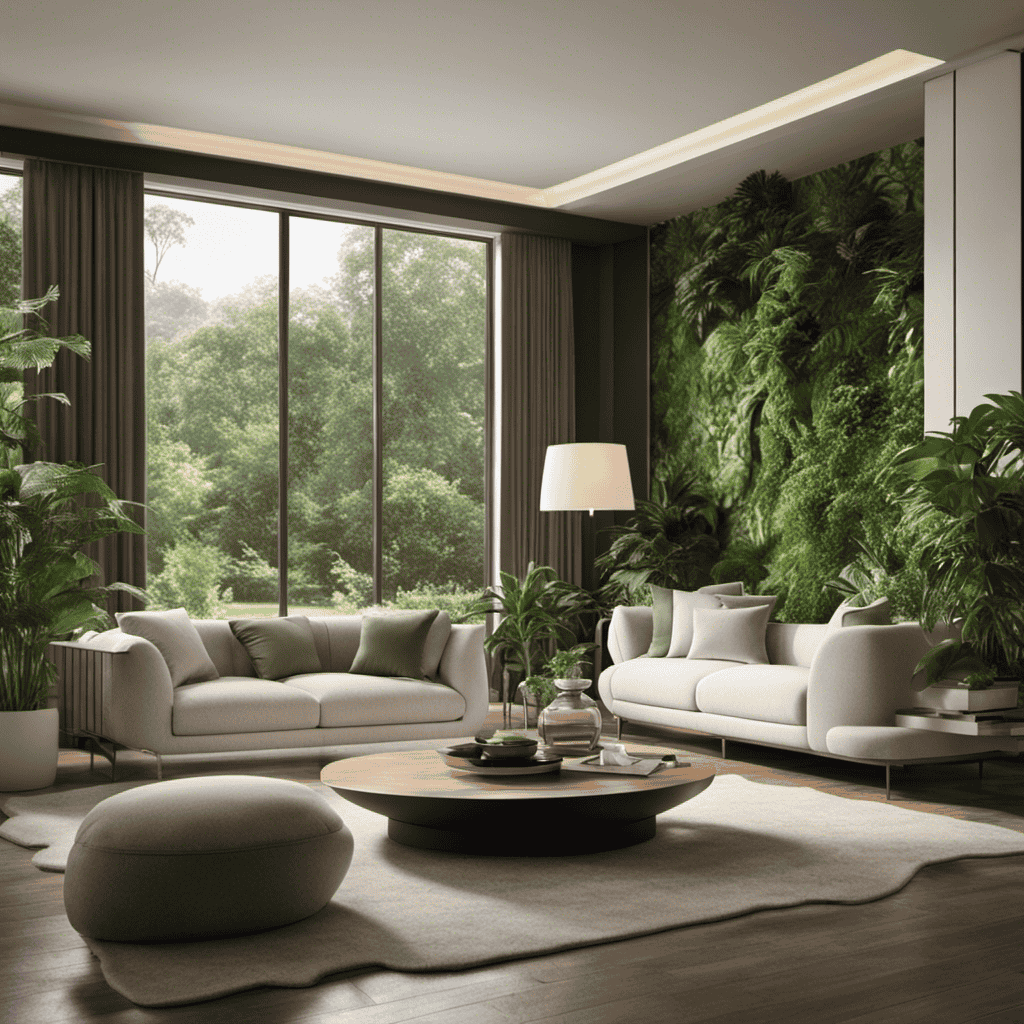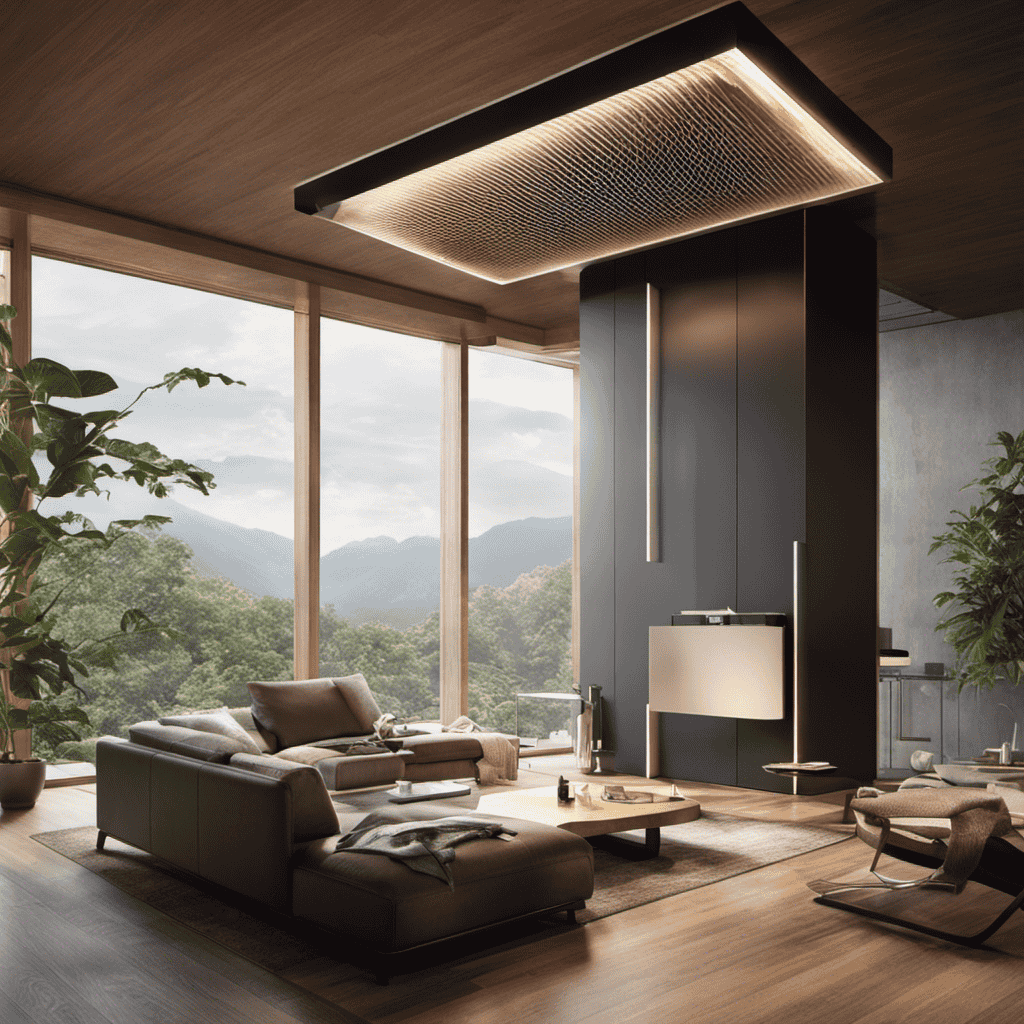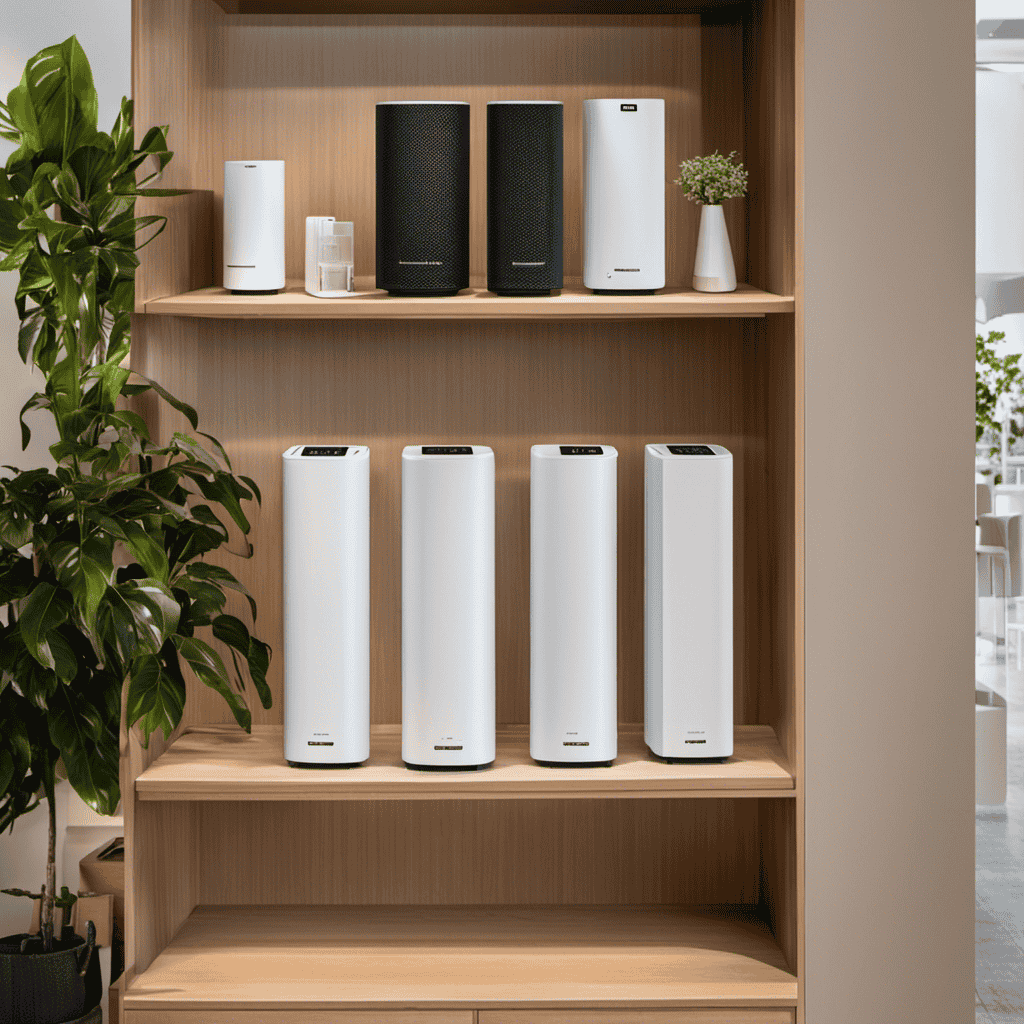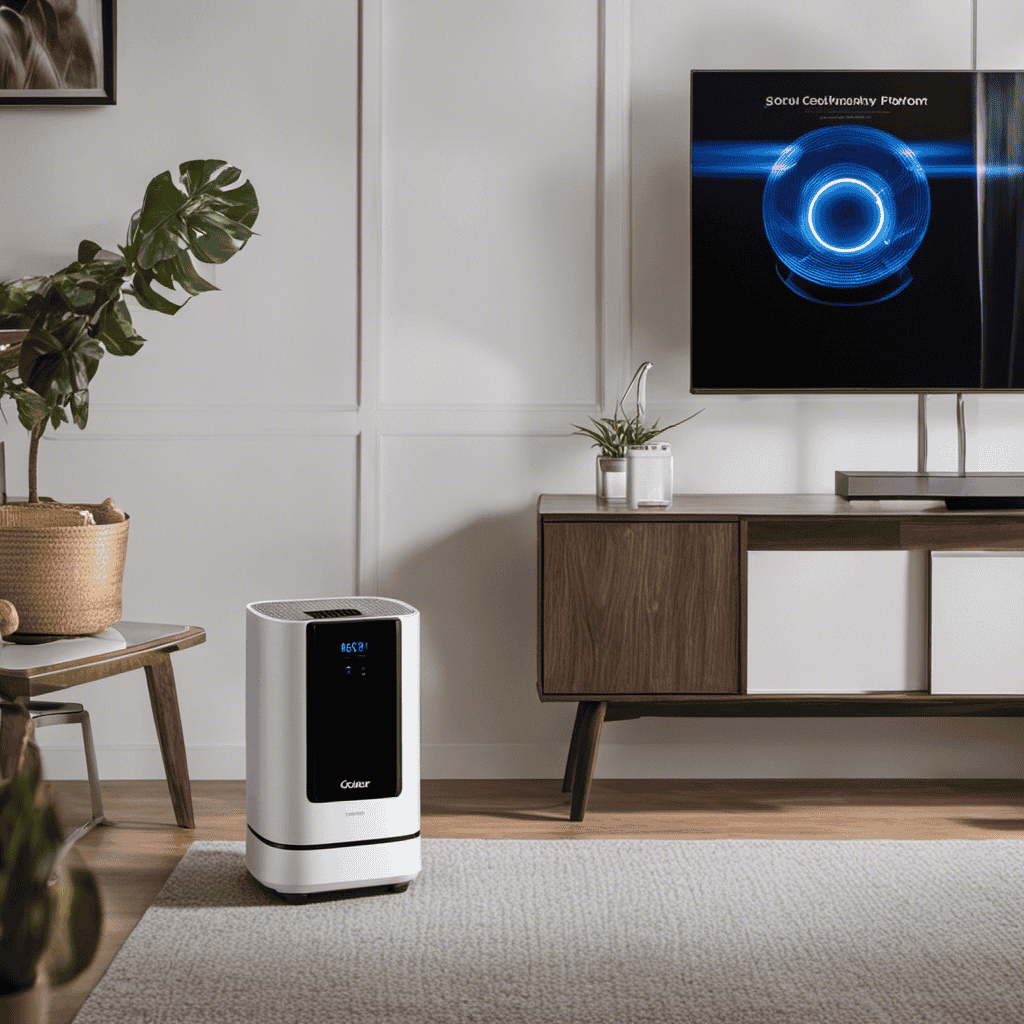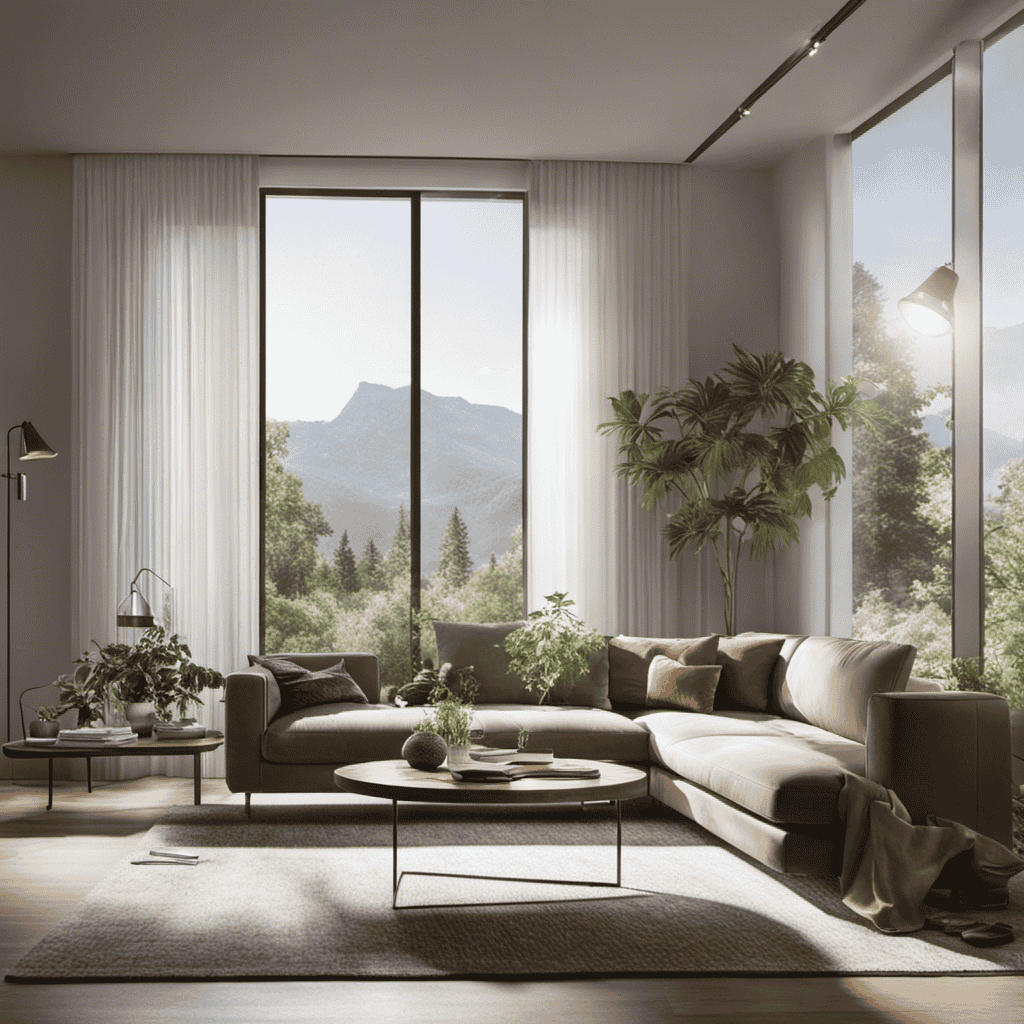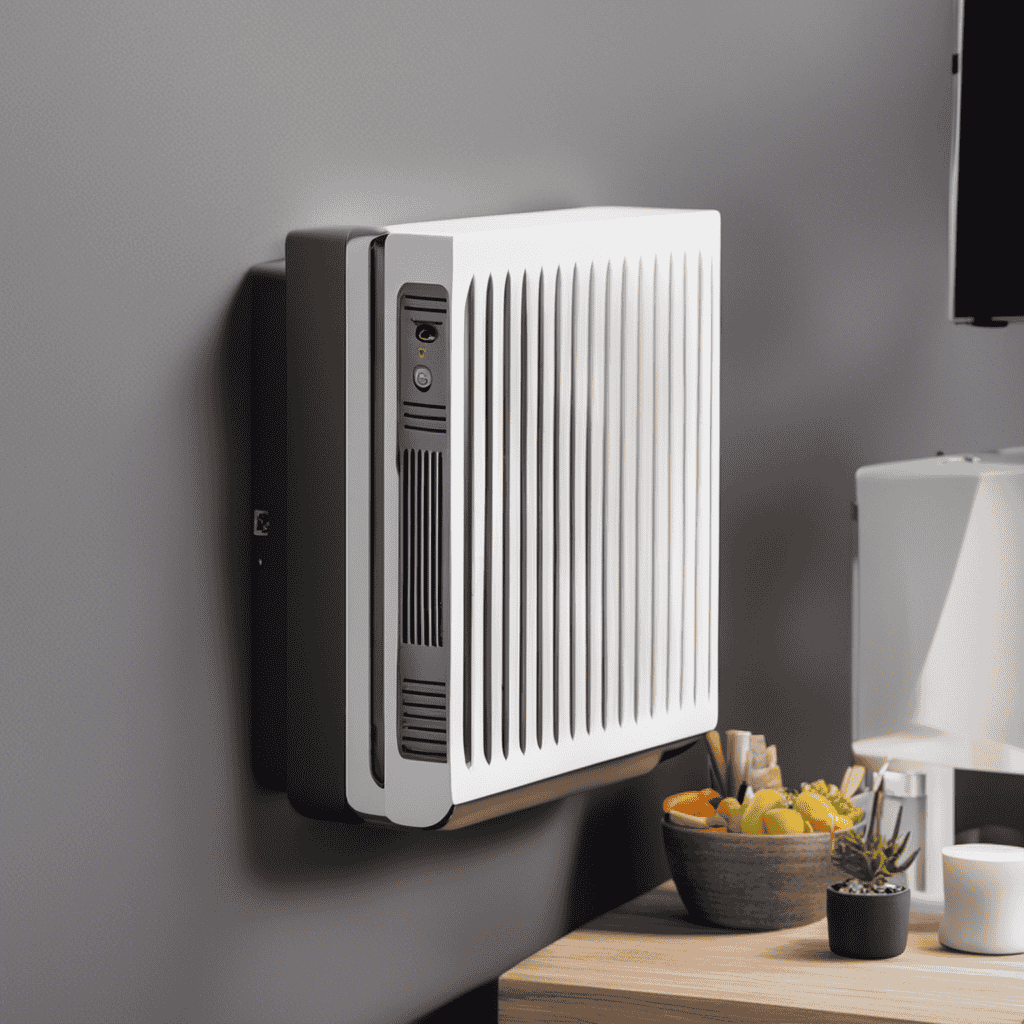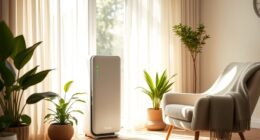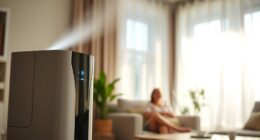Were you aware that on average, people spend about 90% of their time indoors? With such a large portion of our time spent inside, it is essential to prioritize clean and fresh air for our health.
In this article, I will explore the question, ‘How long can an air purifier be on?’ We will delve into recommended daily usage, factors to consider, and the benefits of running an air purifier continuously.
So, let’s uncover the secrets to optimizing air purifier runtime and creating a healthier indoor environment.
Key Takeaways
- Aim to use air purifiers for 8-12 hours a day
- Excessive usage can have potential health risks
- Regularly clean or replace filters for optimal performance
- Overusing air purifiers can decrease air circulation and trap harmful particles
Recommended Daily Usage for Air Purifiers
You should aim to use your air purifier for no more than 8-12 hours a day. While air purifiers are designed to improve indoor air quality, it is important to understand that running them excessively can have potential health risks.
The recommended maintenance for air purifiers includes regularly cleaning or replacing filters to ensure optimal performance. Overusing an air purifier can lead to a decrease in air circulation, trapping harmful particles in the room and potentially causing respiratory issues.
It is also important to consider factors such as room size, air quality, and specific needs when deciding on the appropriate usage duration. By following these guidelines, you can maintain an optimal balance between air purification and potential health risks.
Now, let’s explore the factors to consider when running an air purifier.
Factors to Consider When Running an Air Purifier
When running an air purifier, it’s important to consider various factors.
One of the key factors to keep in mind is the recommended cleaning methods for your specific air purifier model. Different air purifiers have different maintenance requirements, so it’s crucial to follow the manufacturer’s guidelines to ensure optimal performance. Regular cleaning can help remove accumulated dust, allergens, and other pollutants from the filters, ensuring that the air purifier continues to work effectively.
Another important factor to consider is potential health risks associated with air purifier usage. While air purifiers can help improve indoor air quality, they may also produce byproducts such as ozone or volatile organic compounds (VOCs). These byproducts can be harmful if not properly managed. It is essential to choose air purifiers that meet industry standards and have been tested for safety. Additionally, it’s crucial to place the air purifier in a well-ventilated area to prevent the buildup of potentially harmful substances.
Understanding the power consumption of air purifiers is another vital consideration. In the next section, we will explore how much energy air purifiers typically consume and how to optimize their usage to minimize energy usage and costs.
Understanding the Power Consumption of Air Purifiers
To understand how much energy air purifiers typically consume, it’s important to consider their power consumption and how to optimize their usage. A power consumption analysis can help determine the amount of electricity an air purifier uses and identify energy-saving features that can reduce its energy consumption. By understanding the power requirements of an air purifier, you can make informed decisions about how long it can be on and how to minimize its impact on your energy bill.
Here is a table that highlights the power consumption of different air purifier models:
| Air Purifier Model | Power Consumption (Watts) | Energy Saving Features |
|---|---|---|
| Model A | 50 | Timer |
| Model B | 100 | Sleep Mode |
| Model C | 150 | Auto Mode |
The Benefits of Running an Air Purifier Continuously
As an air quality expert, I can attest to the constant air purification benefits of running an air purifier continuously.
By keeping the air purifier on at all times, you ensure a consistent removal of pollutants such as dust, allergens, and volatile organic compounds (VOCs).
This leads to long-term air quality improvement, resulting in a healthier and more comfortable living environment.
Constant Air Purification Benefits
You’ll love the constant air purification benefits of keeping your air purifier on for an extended period of time.
When you use your air purifier consistently, it helps maintain a constant air quality by continuously filtering out airborne pollutants.
By running your air purifier for longer periods, you ensure that the air in your home remains clean and healthy throughout the day.
Prolonged air purifier usage allows the device to effectively remove allergens, such as pollen and pet dander, as well as pollutants like smoke and dust particles.
It also helps reduce the presence of bacteria and viruses in the air, promoting a healthier living environment.
Long-Term Air Quality Improvement
By consistently using it, your home’s air quality will improve over time. Air purifiers are designed to remove pollutants and allergens from the air, resulting in cleaner and healthier indoor air. Here are some ways in which long-lasting air purification can contribute to improving indoor air quality:
-
Reduction of dust and pet dander: Air purifiers can capture and trap particles such as dust and pet dander, which are common allergens that can cause respiratory issues.
-
Elimination of odors: Air purifiers with activated carbon filters can help remove unpleasant odors, such as cooking smells or pet odors, making your home smell fresher.
-
Filtering out airborne bacteria and viruses: Some air purifiers are equipped with HEPA filters that can capture airborne bacteria and viruses, reducing the risk of respiratory infections.
How Long Can You Leave an Air Purifier on in a Closed Room
Make sure not to leave the air purifier on in a closed room for an extended period of time. While air purifiers are effective at removing pollutants and improving indoor air quality, it is important to use them correctly to avoid potential risks.
The recommended duration for running an air purifier in a closed room depends on various factors, such as the size of the room and the air purifier’s capacity. Generally, it is advisable to run the air purifier for a few hours a day to maintain optimal air quality. Leaving it on continuously may not provide any additional benefits and can increase energy consumption.
Additionally, prolonged exposure to the ozone emitted by some air purifiers can be harmful. Therefore, it is important to follow the manufacturer’s instructions and use the air purifier responsibly.
The Impact of Extended Usage on Air Purifier Performance
Extended usage of an air purifier can have various effects on its performance.
One key point to consider is that prolonged use can lead to a deterioration in air quality if the filters are not regularly maintained or replaced. This is because the filters can become clogged with pollutants over time, reducing their effectiveness in trapping airborne particles.
As a result, the frequency of maintenance, such as filter replacements, may need to be increased to ensure optimal performance of the air purifier.
Extended Usage Effects
If you leave the air purifier on for too long, it can have negative effects on your health. Extended usage risks associated with continuous operation of an air purifier include:
-
Dryness and irritation of the respiratory system:
Prolonged exposure to purified air can lead to dryness in the throat, nose, and eyes. This can cause discomfort, coughing, and difficulty in breathing. -
Reduced immune response:
Constantly inhaling purified air may weaken the body’s natural immune response. Over time, this can make individuals more susceptible to respiratory infections and allergies. -
Increased indoor pollutants:
Air purifiers work by trapping and filtering airborne pollutants. If operated continuously without proper maintenance, the filters can become saturated and release captured pollutants back into the air.
To ensure a healthy indoor environment, it is important to use air purifiers responsibly and follow manufacturer guidelines regarding usage and maintenance.
Air Quality Deterioration
Using an air purifier can help improve the quality of the air in your home. Air pollution effects can range from minor irritations like allergies and respiratory issues to more severe conditions like asthma and even heart disease. By removing harmful particles and pollutants from the air, air purifiers can significantly reduce these health risks.
However, it is important to note that the lifespan of an air purifier can vary depending on factors such as the model, usage, and maintenance. On average, most air purifiers last anywhere from 5 to 10 years. Regular maintenance, such as cleaning or replacing filters, can extend the lifespan of your air purifier and ensure its optimal performance in improving the air quality in your home.
Maintenance Frequency Increase?
To increase the lifespan of your air purifier and maintain its optimal performance, it’s recommended to regularly clean or replace the filters. Proper maintenance frequency is crucial for the efficient operation of your air purifier. Here are some key points to consider:
-
Filter cleaning: Depending on the type of air purifier you have, the filters should be cleaned every 1-3 months. This helps remove dust, allergens, and other particles from the filters, ensuring better air quality.
-
Filter replacement: Over time, filters can become clogged or worn out. It’s important to replace them according to the manufacturer’s guidelines. This typically ranges from every 6-12 months.
-
Energy consumption: Regular maintenance can also help reduce energy consumption. Clean filters allow the air purifier to work more efficiently, requiring less power to operate.
Expert Tips for Optimizing Air Purifier Runtime
Make sure you’re not running your air purifier for extended periods of time without taking breaks, as experts recommend optimizing its runtime for better efficiency.
To help you make the most of your air purifier, here are some expert tips:
-
Recommended Filter Replacement: Regularly replacing the filters is crucial for maintaining the air purifier’s effectiveness. Experts suggest checking the manufacturer’s recommendations for filter replacement frequency and following them diligently.
-
Energy Saving Modes: Many air purifiers come with energy-saving modes that help conserve power. These modes typically reduce the fan speed or adjust the operation based on the air quality. Utilizing these modes not only saves energy but also extends the runtime of your air purifier.
Safety Precautions for Leaving an Air Purifier On Overnight
Before leaving it on overnight, remember to check the safety precautions for your air purifier. It is important to ensure that your air purifier operates safely and effectively, especially when running it for extended periods of time.
Here are some key safety precautions to keep in mind:
-
Placement: Make sure to place your air purifier on a stable surface and keep it away from any flammable materials or sources of heat.
-
Maintenance: Regularly clean and replace the filters according to the manufacturer’s instructions to prevent the buildup of dust and pollutants.
-
Noise level: Consider the noise level of your air purifier, especially if you plan on running it during the night. Some models may produce louder sounds that can disturb your sleep.
Frequently Asked Questions
Can I Leave My Air Purifier on All Day and Night?
Yes, you can leave your air purifier on all day and night. However, it’s important to consider its energy consumption and optimal usage.
Is It Safe to Run an Air Purifier Continuously for Weeks or Months?
Running an air purifier continuously for weeks or months may not be energy efficient. It can also shorten the lifespan of the filters. It’s important to find a balance between air purification and energy conservation.
Can Air Purifiers Cause Any Harm if Left on for Extended Periods?
Extended use of air purifiers can have potential dangers due to prolonged exposure to emissions. Additionally, it’s important to consider the impact of long-term use on energy consumption.
How Long Should I Wait Before Turning off My Air Purifier in a Closed Room?
In terms of air purifier efficacy and optimal air purifier usage, it is important to consider how long one should wait before turning off the device in a closed room.
Are There Any Specific Health Benefits to Keeping an Air Purifier on for Longer Periods of Time?
Extended use of an air purifier can have specific health benefits. It helps to continuously improve air quality, reducing allergens and pollutants. However, it is important to follow manufacturer’s guidelines on usage time.
Conclusion
In conclusion, it is important to consider the recommended daily usage and power consumption of an air purifier. While it is generally safe to leave an air purifier on for extended periods, it is crucial to monitor its performance and ensure proper maintenance.
By optimizing runtime and following safety precautions, you can enjoy the benefits of cleaner air.
But, have you ever wondered how long you can leave an air purifier on before it starts to lose its effectiveness?
